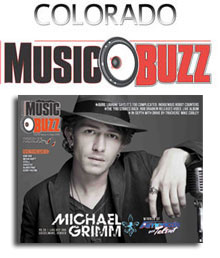The Manager’s Corner- July
by Chris Daniels
I’ve managed my own band for 31 years and I’m in the Colorado Music Hall of Fame. All that’s nice but today’s music business is changing at light-speed and you have to be more engaged in the ‘biz’ than ever. Some things have not changed, careers are still built on some tried and true elements: great music, performance and timing. But today’s artists must work harder than ever to succeed. The good news is that we have new tools to help young musicians grow their fan base. The book I wrote for the course I teach at CU Denver on artist management is called “DIY: You’re Not in it Alone.” While you are ultimately responsible for your own career, these days it’s essential to make the most of all the help that is offered along the way.
People talk about the “music business” without specifying what they mean. Sadly, many writers and observers of the entertainment industry use the term music business to mean the sale and distribution of recordings. While that specific business generates a remarkable amount of press, especially in the past few months with the launch of Tidal and the iTunes streaming service, and Taylor Swift’s challenge of iTunes’ “first 3 months free” non-payment of artists policy, the facts remain the same. For independent artists, Spotify pays and average of ½ a cent per stream and iTunes’ new service pays less, .002 cents per stream. That means if you put out a song on either one of these services and one person loves it enough to stream it 1,000 times, you, the independent artist is going to get about 50 cents! That is approximately 1/3 of what a major label artist would have received had the same fan bought the CD or downloaded the whole album from iTunes. So with all this media coverage talk about the “music business,” it is inaccurate and only a segment of the market.
For example, look at the concert business: this summer the major promoters in town will present over 120 shows at Red Rocks. Red Rocks seats 9,450 music fans if every seat available is sold. The City of Denver owns Red Rocks, not Live Nation or AEG or Bill Bass Presents or Soda Jerk. The city charges promoters approximately $35,000 vs. 12% of the gate. That means a $60 average ticket on a sellout show earns the city of Denver about $68,000. Multiply that times 120 and that is about eight million dollars. Now, Denver Theaters and Arenas and the good folks who run that department are no fools and they want to encourage promoters to use their facilities. So they offer a rebate of between 30% and 40% on that fee to promoters who do five or more shows at Red Rocks. Add to that revenue for Denver all the “ancillary” revenue for beer, soft drinks, a merch sale percentage, parking and the like and Red Rocks is a very healthy revenue generator for the music business and the city of Denver. Nothing wrong with that, and, it employs a boat load of folks like stage hands, ticket takers, beer sellers, hot dog vendors, merch sellers, security and the like. And Red Rocks is only one of a large number of “major” venues that include Sports Authority Field, The Pepsi Center, FirstBank Center, The Fillmore, Budweiser Events Center and Fiddler’s Green to name only a few. All these major venues are presenting music and finding ways to make a profit doing it. And that doesn’t even begin to cover the smaller venues from Ft. Collins to Colorado Springs and in the mountain towns. Add to that the remarkable festival offerings from major players like Planet Bluegrass, who won the Pollstar 2014 Best Festival Award for The Telluride Bluegrass Festival, to all of the offerings from Greeley to Grand Junction in Blues, Jazz, alternative, bluegrass and all the touring festivals like Vans Warped Tour.
Concerts are only one of the many areas in the music business that are evolving and adapting to the new reality. The songwriting world is another area that’s adapting. Publishing has been hurt by the reduction in record sale revenue but with the advent of webisodes and all the increase in cable, broadcast and online music “use” songwriters are finding ways to connect to new audiences through placements. In addition, as I’ve discussed in this column a number of times, the PROs (performing rights societies) set up a system where songwriters can report the songs they perform at gigs and get paid for that. And the economics of a hit song are still pretty staggering. I spoke with the writer of one of John Denver’s biggest hits a year ago and he told me that his royalties for that one song have exceeded three million dollars. In a recent court case ruling for the cop in the Village People it was revealed that YMCA has earned over 10 million dollars. My own opinion is that the writers that are coming down the pike are exceptional. From Johnnyswim to The Lumineers, the writing is fresh and exciting.
Thirty years ago when Neil Young sang “This Note’s For You,” his anthem and parody about rock stars taking money from major corporations to sponsor their tours or become spokespersons for products – it was considered “selling out” to take corporate money. My band, Chris Daniels & The Kings, was sponsored by Coors and I got a lot of crap from my peers about taking that sponsorship. But then, like now, it made touring possible for me. The Rolling Stones were the first to take more than a million dollars from a major corporation for a tour. Since then musicians and their management teams have changed their tune about corporate support. And in 2015 it is almost essential to the bottom line for artists. In fact, the king of “branding,” Gene Simmons famously said, “KISS is not a band, it’s a brand.” And major corporations from string and microphone manufacturers to banks and car companies broke all the sponsorship dollar records in 2014 with support for music and to be affiliated with music ”brands” like U2. Despite the mistakes of U2 and Apple last year, audiences don’t seem to have the negative reaction they once did to seeing their favorite artist sponsored by a major corporation. It’s become commonplace.
So the next time you read or hear about the “doom and gloom” in the “music business,” look closely at the articles being presented. My experience tells me that the writers are decrying the “end of the record business as we know it” – to riff on REM. That is simply not the “music business” – or at least not all of it. It’s the record business – or more accurately – the delivery of recorded music business – and that part of our industry is undergoing a complete revolution. Major labels are struggling. But independent labels are figuring out new and better ways to market music to their fans.
For those of us who watch and study the industry, it’s going to be a while before the dust settles in the record business. Will Apple’s streaming service be viable for people who live in that Apple “environment,” will Spotify ever turn a profit, will streaming actually diminish or erase illegal downloading? It’s hard to tell at this early stage. We know that the number of paid downloads were down about 12% last year while streaming was up a little over 50%. The trend of fans wanting complete access to music for little or nothing is not going to change. It’s no longer necessary to argue that it helps the artist connect with the fans. It does. But the fact remains that the revenue stream to the artist (except for those chosen few with multi-platinum sales) is drastically reduced. Do concert, publishing and sponsorship revenue cover the difference? Only time will tell. What is clear in any trade publication you read from Colorado Music Buzz to Village Voice is that there are more and more artists touring and performing than ever before. Will the marketplace become saturated? Let’s see what happens at the end of the 120-show Red Rocks summer of 2015. Stay tuned music-lovers, it’s getting mighty interesting.
Category: Shop Talk






